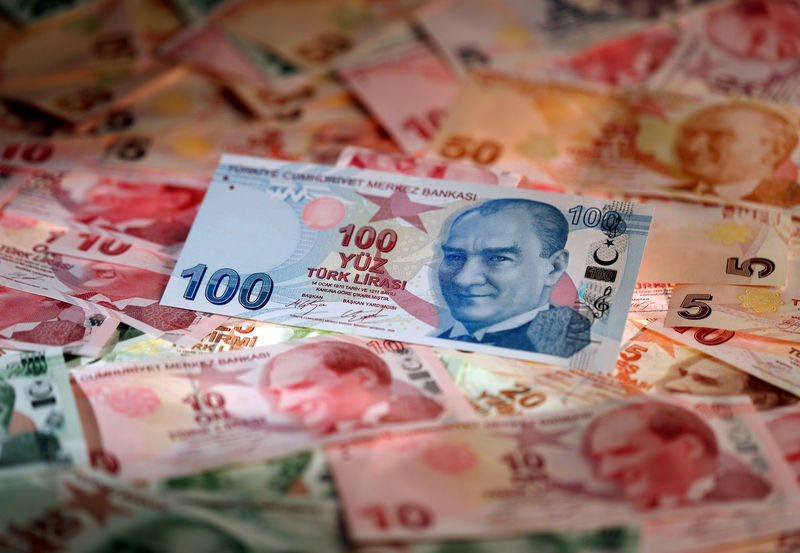By Sujata Rao
LONDON (Reuters) - Action from Turkey's central bank pushed the lira higher for a second day on Wednesday, helping European stocks and emerging currencies consolidate recent losses though the dollar ensconced at 13-month highs kept up the pressure on world markets.
The lira bounced another 5 percent, sharply extending Tuesday's gains as authorities further tightened the screws on foreigners aiming to short the currency. The lira is now around 6 per dollar, off record lows beyond 7.24
However, it started 2018 at 3.75 and the rebound follows a 36 percent drop over the past month. Fear of full-blown crisis and debt defaults in the country of 80 million people is far from over as the central bank's failure to tackle galloping inflation and Ankara's diplomatic tiff with Washington keep investors wary.
"It has calmed down a bit, the reason is that the Turkish lira is appreciating and that is causing people to re-focus on country-specific fundamentals so the contagion effect naturally is less," said Koon Chow a strategist at fund manager UBP.
He said however there had been little fundamental change to celebrate and added: "It's only a temporary thing for Turkish markets, I'm not sure (volatility) is over."
The Turkish worries have in recent days driven a capital exodus from across emerging markets, sending currencies from the Argentine peso to the Indian rupee to record lows, while emerging equities (MSCIEF) have tumbled almost 20 percent from January highs.
There are also concerns about China's slowing economy -- reinforced by this week's data on investment and industrial output -- and the yuan's weakening to 15-month lows against the dollar is also pressuring other Asian markets.
Indonesia, acting after the rupiah fell to three-year lows, raised interest rates for the fourth time since May
European shares opened flat, though liquidity was severely thinned by a holiday in many countries (STOXX).
Earlier, Asian shares excluding Japan (MIAPJ0000PUS) slid more than 1 percent to one-year lows while MSCI's all-country equity benchmark was a quarter percent lower (MIWD00000PUS). But it stayed off one-month lows reached on Monday.
Chinese shares (HSI) (SSEC) lost more than 1 percent, pressured by signs the world's second-largest economy is losing momentum amid a trade conflict with Washington. Japanese shares too dropped one percent (N225).
U.S. President Donald Trump has slapped hefty tariffs on a swathe of Chinese goods, prompting retaliation from Beijing.
Global trade tensions show little sign of easing, with Beijing now lodging a complaint to the World Trade Organisation to help determine the legality of U.S. tariff and subsidy policies.
Turkey too has raised tariffs on some U.S. products "in response to the U.S. administration's deliberate attacks on our economy", Vice President Fuat Oktay wrote on Twitter on Wednesday.
President Tayyip Erdogan has called a boycott on U.S. electronic goods.
Jameel Ahmad, global head of currency strategy at FXTM brokerage said the escalation of tensions between the United States and Turkey reminded investors "it is not just the United States and China that stand at the heart of the global trade war concerns."
Wall Street closed higher on Tuesday, continuing to draw support from forecast-beating company earnings but New York stocks appear set for a weaker opening, futures show <.ESC1>.
SAFETY
The concerns have driven investors to embrace assets such as German and U.S. government bonds, the Japanese yen and Swiss franc, which are considered safer. German and U.S. 10-year yields are down more 10 bps this month (DE10YT=RR) (US10YT=RR).
The other beneficiary has been the dollar. Already resurgent thanks to the high yield it offers, it has surged to 13-month peaks against a basket of currencies (DXY).
"In light of all the turmoil we've seen out of Turkey and the subsequent contagion into other emerging markets, the dollar is pretty much establishing itself as the safe-haven currency," said Bart Wakabayashi, Tokyo branch manager at State Street Bank.
"If you are going to park your money somewhere to stay away from the turmoil, the dollar is going to be the currency of choice,"
The strong dollar's victims are of course emerging currencies -- many of them remain under pressure despite the lira's recent bounce. But the greenback's rise has also pummelled euro and sterling.
The former has been hit also by jitters around euro zone banks' exposure to Turkey (EUR=EBS). The single currency slipped another 0.2 percent to a new 13-month low versus the dollar and it also extended losses against the Swiss franc (EURCHF=)
Sterling meanwhile tumbled under $1.27 for the first time since June 2017, having lost ground for 11 days in a row, its longest losing streak since 2008
However, gold
"The dollar will continue to be the safe-haven asset of preference. As a consequence, gold prices are really going to struggle," said Daniel Hynes, an analyst at ANZ Bank.
